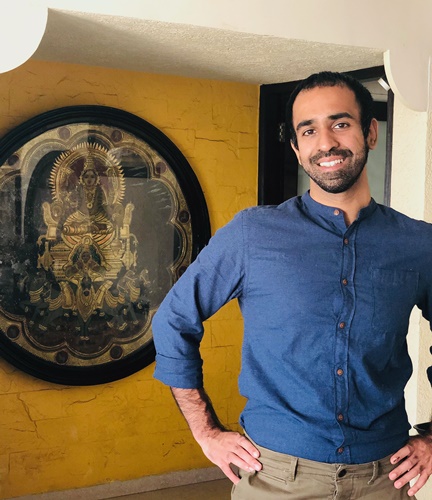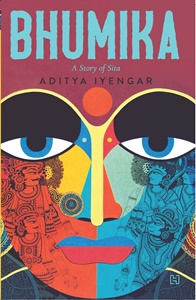Aditya Iyengar is a writer from India. He writes Indian mythological and historical fiction and also enjoys constructing epic fantasies. His works include The Thirteenth Day, Palace of Assassins, A Broken Sun, The Conqueror and Bhumika, which was shortlisted for the Mathrubhumi Book of the Year 2020.
In this interview with Swetha Amit, Aditya talks about the inspiration behind the book, stereotypes attached to women and loneliness.
1.Bhumika is an interesting depiction of the tale of two feisty women from Ramayana. How did the idea initially come up?
I don’t really remember. I think I was watching a play on the Ramayana when I found myself wondering what would happen if Rama and Sita had never met, or met in different circumstances. I wanted to write a novel about women too, since I had never done that before. At the same time, I wanted to explore the question of ‘choice’ and ‘free will’ in the context of a woman – how many choices are their own, and how many are made for them? Also, how do we, as humans, deal with the choices we have no control over, and how do we learn to celebrate the choices we make rather than putting ourselves down. All of these came together, quite fortuitously and the result is Bhumika.
2.Did reimagining such a story from Bhumika’s perspective require some research? How did you go about the process?
At one level, the research was already done for me. I’ve grown up with a lot of strong women around me. My mother, especially – who brought me and my brother up single handedly. I used these examples to fashion the character of Bhumika and her motivations broadly. A lot of Bhumika however was also determined by the way I thought I would approach issues if I were a woman – so I used both a combination of both a lived experience and imagined experience to write her character.
3.Your book addresses issues that women face with regards to choices and whether they were happy with such choices. What according to you brings satisfaction and happiness in life?
There is no simple answer. And I think everyone has a different answer, so using someone else’s life as an example is pointless. I think happiness and satisfaction come when you don’t regret your choices in life, and a lot of that has to do with being able to look at your life positively. At one level, it implies attempting to look at your choices as being the best that could have been done given everything, and feeling good about yourself. ?
4.The story also showcases certain stereotypes attached to women with regards to their roles or professions. Do you feel things are changing now?
Absolutely, I think women are looking at themselves differently, and so are men. The old expectations no longer hold true. And while women are expecting different things from themselves, they are also having greater expectations of men, which is a very good thing. ??Whether career woman or home maker, single or married - ultimately, how a woman desires to lead her life, is something that should only be left to her. I’d like to believe socially, we’re making some progress on that count, though there is obviously a very, very long way to go before we can have a completely equal society sans prejudice and unfair expectations.
5.An interesting line in your book states that too much change is not a good thing. Considering the notion that change is for the better, what is your take on this?
The line on too much change not being a good thing is the perspective of a specific character. I think, regarding the adage that change is for the better – it really depends on factors like what kind of change is being implemented and when it is taking place. I don’t think as a blanket rule that all change is for the better. Change needs to come at the right time, in an appropriate way.
6.From Bhumika’s perspective, Mithila stood for diversity as opposed to Ayodhya’s obedience and uniformity. Do you think diversity is a boon or a bane?
Diversity is a wonderful thing. We need more perspectives, more cultural influences, more ideas coming in. Plurality is one of our strengths as a culture and needs to be celebrated and amplified.
7.The book also deals with the theme of purity. What does purity mean to you?
I think purity is an impossible ideal. Also, diverse influences generally make for stronger ideas that take more people and factors into account.
8.Loneliness is another aspect mentioned in your book. Considering that this seems to be a universal issue, how does one combat this element?
In the context of the novel Bhumika, I think Sita and Bhumika are lonely in different ways because they cannot speak their minds freely - each for a variety of reasons. They also don’t have anyone to talk with about their problems that are very unique. Regarding loneliness in general as a universal issue, I think there are no simple answers here. Circumstances and the family and community you have around you play a huge role in alleviating it. We need to reach out to people who are lonely and communities have to expand to include as many people of as many diverse backgrounds as possible.
9.Lastly, what are your plans? Any more books in the pipeline?
A: I have a few thoughts, but I’m working on nothing as of now.





















